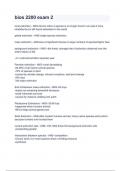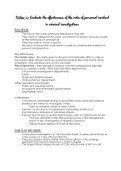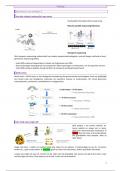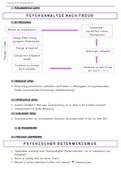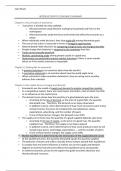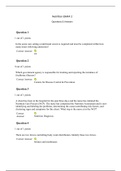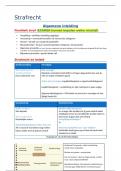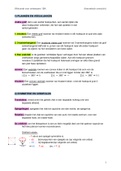Liberalism Revision Pack
Context of Liberalism:
- Age of enlightenment/reason was a revolution of thought in mid 1600s
# free thinking rather than bling faith, reason rather than religion
- During middle ages, there was a rigid set of thinking
# Everything ordered by God in a hierarchical manner
- Science was begging to disprove many teachings of the church
# people were starting to challenge those who has a monopoly in power (church and monarch)
NB: Many early liberals from the enlightenment were spiritual and religious, however, they called out people
that used God and the Bible to justify their wrongdoings
- Central teaching of enlightenment is that we are creatures of reason
# we have capacity to reason and make decisions for ourselves
Mechanistic theory - the state is created by people for purpose of protection (the state services the people not
the other way around)
Key Thinkers and Core Ideologies
Key thinker No. 1 - John Locke (early/classical liberalism)
Human Nature:
- Has quite an upbeat view on human nature
# humans are being of reason
- The Church portrayed humans as creatures of sin, that were expelled from paradise
# our only form of salvation was through prayer and obedience
- The enlightenment turns humans from passive to active creatures
# masters of our own destiny
Individual agency – people are free to make their own decisions and to change their fate
- Locke would also agree with the idea of:
Non key thinker – Thomas Hobbes
Egotistical individualism – humans are naturally drawn to their own self advancement, however, because we
are rational, it does necessarily lead to conflict with others
# Opposite of what Locke believes ; argued that humans are brutish and selfish
Every human seeks:
1. Self-realisation – discovering our true selves
2. Self-determination – ensuring we are the masters of our own fate
3. Self-fulfilment – ensuring we have fully utilised our “natural” rights and more the most of our talents
The State:
- Locke denied the medieval principle that the state was part of God’s creation
# rejected the divine right of kings (monarchs had been appointed by God himself to rule)
State of Nature Vs State of Law
- Locke argued that before the state’s existence, there was a “natural state” that which served the
interests of mankind well (the state of nature)
, Liberalism Revision Pack
# was underpinned by natural rights and natural laws
- However, the state of law (the modern state) was therefore designed to improve the state of nature,
by resolving issues between individuals better
# state of law is only legitimate if it respects natural rights, ensuring individuals are no worse off than
in the state of nature
Social contract theory – citizens have voluntarily consented to the state’s rulings and in return, the state
protects their natural rights and improves their situations
- Due to its “contractual nature”, there would be:
Limited/minimal government – limited to govern with pre agreed rules requiring on going consent from
individuals
power should also be scattered and fragmented
# opposed pre enlightenment states, where power was concentrated in the monarchy
Synoptic Link – “The Bill of Rights” is a constitutional document which protects certain rights
E.g. the right to free speech
- Liberals were also wary of parliamentary sovereignty, which placed power in the hands of the state
# could lead to the development of “illiberal” ideas e.g. the persecution of minority groups
Society:
- Locke’s “natural society” and “state of nature”
# society was one that facilitated natural rights (rights to life and property), natural laws (recognising
natural rights should not be hindered) and natural justice (any hinderance of natural rights requires
compensation)
The economy:
Economic liberalism – known as capitalism, belief in the private ownership of property
- Locke emphasises property is a natural right which predates the existence of a state
# furthermore, when property is owned by many individuals, this offers further protection against
concentrated power from rulers who could threated natural rights
Non key thinker – Adam Smith
- If obstacles to free trade were swept away, and individuals could trade freely, the “invisible hand”
would enrich individuals
# some liberals argued that individual economic success would result in a “trickle down“ effect to the
rest of society
Individualism/Freedom:
- Humans are rational creatures who will seek to exercise their natural rights in society
Negative liberty – liberty means freedom from interference by both government and individuals
- Through limited government, individuals should be free from too much state intervention
# this could hinder individuals unlocking their full potential
Meritocracy – the state should reward individual effort and achievement
- Some liberals argue that this is consistent with human nature
# at heart as “selfish beings”, we rationalise the idea that those who work deserve rewards
Foundational equality – all individuals are born equal and are therefore entitled to equal treatment by the
state
Context of Liberalism:
- Age of enlightenment/reason was a revolution of thought in mid 1600s
# free thinking rather than bling faith, reason rather than religion
- During middle ages, there was a rigid set of thinking
# Everything ordered by God in a hierarchical manner
- Science was begging to disprove many teachings of the church
# people were starting to challenge those who has a monopoly in power (church and monarch)
NB: Many early liberals from the enlightenment were spiritual and religious, however, they called out people
that used God and the Bible to justify their wrongdoings
- Central teaching of enlightenment is that we are creatures of reason
# we have capacity to reason and make decisions for ourselves
Mechanistic theory - the state is created by people for purpose of protection (the state services the people not
the other way around)
Key Thinkers and Core Ideologies
Key thinker No. 1 - John Locke (early/classical liberalism)
Human Nature:
- Has quite an upbeat view on human nature
# humans are being of reason
- The Church portrayed humans as creatures of sin, that were expelled from paradise
# our only form of salvation was through prayer and obedience
- The enlightenment turns humans from passive to active creatures
# masters of our own destiny
Individual agency – people are free to make their own decisions and to change their fate
- Locke would also agree with the idea of:
Non key thinker – Thomas Hobbes
Egotistical individualism – humans are naturally drawn to their own self advancement, however, because we
are rational, it does necessarily lead to conflict with others
# Opposite of what Locke believes ; argued that humans are brutish and selfish
Every human seeks:
1. Self-realisation – discovering our true selves
2. Self-determination – ensuring we are the masters of our own fate
3. Self-fulfilment – ensuring we have fully utilised our “natural” rights and more the most of our talents
The State:
- Locke denied the medieval principle that the state was part of God’s creation
# rejected the divine right of kings (monarchs had been appointed by God himself to rule)
State of Nature Vs State of Law
- Locke argued that before the state’s existence, there was a “natural state” that which served the
interests of mankind well (the state of nature)
, Liberalism Revision Pack
# was underpinned by natural rights and natural laws
- However, the state of law (the modern state) was therefore designed to improve the state of nature,
by resolving issues between individuals better
# state of law is only legitimate if it respects natural rights, ensuring individuals are no worse off than
in the state of nature
Social contract theory – citizens have voluntarily consented to the state’s rulings and in return, the state
protects their natural rights and improves their situations
- Due to its “contractual nature”, there would be:
Limited/minimal government – limited to govern with pre agreed rules requiring on going consent from
individuals
power should also be scattered and fragmented
# opposed pre enlightenment states, where power was concentrated in the monarchy
Synoptic Link – “The Bill of Rights” is a constitutional document which protects certain rights
E.g. the right to free speech
- Liberals were also wary of parliamentary sovereignty, which placed power in the hands of the state
# could lead to the development of “illiberal” ideas e.g. the persecution of minority groups
Society:
- Locke’s “natural society” and “state of nature”
# society was one that facilitated natural rights (rights to life and property), natural laws (recognising
natural rights should not be hindered) and natural justice (any hinderance of natural rights requires
compensation)
The economy:
Economic liberalism – known as capitalism, belief in the private ownership of property
- Locke emphasises property is a natural right which predates the existence of a state
# furthermore, when property is owned by many individuals, this offers further protection against
concentrated power from rulers who could threated natural rights
Non key thinker – Adam Smith
- If obstacles to free trade were swept away, and individuals could trade freely, the “invisible hand”
would enrich individuals
# some liberals argued that individual economic success would result in a “trickle down“ effect to the
rest of society
Individualism/Freedom:
- Humans are rational creatures who will seek to exercise their natural rights in society
Negative liberty – liberty means freedom from interference by both government and individuals
- Through limited government, individuals should be free from too much state intervention
# this could hinder individuals unlocking their full potential
Meritocracy – the state should reward individual effort and achievement
- Some liberals argue that this is consistent with human nature
# at heart as “selfish beings”, we rationalise the idea that those who work deserve rewards
Foundational equality – all individuals are born equal and are therefore entitled to equal treatment by the
state

